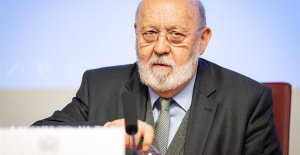Vox clarifies that the company carried out consulting work and that it was the client who made their own decisions
The Provincial Court of Madrid has condemned the company of Rocío Monasterio to carry out the repair and reform works at its expense to adapt to urban legality the illegal work that it carried out in a 'loft' of the presenter Arturo Valls in the Lavapiés neighborhood.
This is stated in a sentence, to which Europa Press had access, in which the Chamber dismissed the appeal filed by Rocío Monasterio y Asociados S.L. against the resolution issued, in July 2021 and which is now confirmed.
In the first instance judgment, the judge of First Instance number 59 of Madrid declared the contractual breach of the consultancy contract signed by Pólvora Films S.L. with the defendant Rocío Monasterio y Asociados S.L. and Diseño de Ambientes para el Confort S.L.
In November 2019, the popular presenter sued the leader of Vox in Madrid for her work as an architect when she converted a premises on Rodas de Lavapiés street into an unlicensed home in 2005.
The obligation to compensate damages and losses was then declared and the defendants were ordered to pay 3,838.49 euros corresponding to the amount of the administrative urban penalty imposed and 4,205 euros (VAT included) corresponding to the amount of demolition costs.
In the same way, they were jointly and severally sentenced, to carry out at their own expense, all repair, reform, replacement, adaptation and adaptation works, even prior demolition of whatever was necessary, to adapt the result of the litigious work within the urban legality. within a period of three months.
TEST FAILED
In the appeal, Monasterio invoked the violation of article 217 of the Civil Procedure Law, considering that the norms of the burden of proof had been altered and raised an error in the evidentiary assessment.
The leader of Vox in Madrid based the challenge on the fact that there had been no breach of the signed contract, being aware that "the works had been carried out without a license and said circumstance having been assumed."
It stated that "no complaint or claim was made for fifteen years regarding the services provided and the change of use from premises to housing was not a fundamental object of the contract and the plaintiff opposed the demolition of the slab that had been built illegally before of the acquisition of the premises due to the fact that it lost a large part of the buildability, and the work was received in May 2006 without any objection".
The magistrates state that "the work has been carried out without having the corresponding municipal permits and without the change of use from premises to housing", for which reason they conclude that there has been "a breach of their contractual obligations".
The Chamber pronounces on the allegation made by the appellant regarding the agreed demolition and imposed sanction does not have its origin in its actions but in "the illegal works previously carried out".
In this regard, it indicates that according to the documents provided "it cannot be considered that said demolition order derived from the works carried out prior to the acquisition by the plaintiff of the premises, but rather from the works carried out by the appellant and therefore, must The reasoning made in this regard in the judgment under appeal must be maintained".
CONSULTING WORK
In a statement, Vox has clarified that the ruling only condemns the payment of "simple" administrative fees, while denying the client of 'Rocío Monasterio y Asociados' (RMA) the payment of up to 250,000 euros that he demanded.
Likewise, it states that in said project RMA carried out consultancy work in which it informed its client of "everything he needed to legalize his work." "It was the client who, after being informed, made his own decisions," he points out.

 Exploring Cardano: Inner Workings and Advantages of this Cryptocurrency
Exploring Cardano: Inner Workings and Advantages of this Cryptocurrency Seville.- Economy.- Innova.- STSA inaugurates its new painting and sealing hangar in San Pablo, for 18 million
Seville.- Economy.- Innova.- STSA inaugurates its new painting and sealing hangar in San Pablo, for 18 million Innova.- More than 300 volunteers join the Andalucía Compromiso Digital network in one month to facilitate access to ICT
Innova.- More than 300 volunteers join the Andalucía Compromiso Digital network in one month to facilitate access to ICT Innova.-AMP.- Ayesa acquires 51% of Sadiel, which will create new technological engineering products and expand markets
Innova.-AMP.- Ayesa acquires 51% of Sadiel, which will create new technological engineering products and expand markets The PP sees the concentration of support for Sánchez in Ferraz as a "failure" and believes that it "complicates" the story of its continuity
The PP sees the concentration of support for Sánchez in Ferraz as a "failure" and believes that it "complicates" the story of its continuity Marc Márquez returns to pole in Jerez
Marc Márquez returns to pole in Jerez The CIS carries out a quick survey on Sánchez's letter to measure the reaction of citizens
The CIS carries out a quick survey on Sánchez's letter to measure the reaction of citizens 12M.- Puigdemont to Sánchez and Illa: "This is not about the future of the PSOE! What have you believed?"
12M.- Puigdemont to Sánchez and Illa: "This is not about the future of the PSOE! What have you believed?" How Blockchain in being used to shape the future
How Blockchain in being used to shape the future Not just BTC and ETH: Here Are Some More Interesting Coins Worth Focusing on
Not just BTC and ETH: Here Are Some More Interesting Coins Worth Focusing on UPV students build a prototype of a wooden house to move to Equatorial Guinea
UPV students build a prototype of a wooden house to move to Equatorial Guinea The UA opens the call for the Impulso 2024 Awards for the best innovative business initiatives
The UA opens the call for the Impulso 2024 Awards for the best innovative business initiatives ALI, virtual assistant from Alicante, internationally recognized by the OECD
ALI, virtual assistant from Alicante, internationally recognized by the OECD Retrópolis brings the golden age of video games and computing to the UPV
Retrópolis brings the golden age of video games and computing to the UPV A million people demonstrate in France against Macron's pension reform
A million people demonstrate in France against Macron's pension reform Russia launches several missiles against "critical infrastructure" in the city of Zaporizhia
Russia launches several missiles against "critical infrastructure" in the city of Zaporizhia A "procession" remembers the dead of the Calabria shipwreck as bodies continue to wash up on the shore
A "procession" remembers the dead of the Calabria shipwreck as bodies continue to wash up on the shore Prison sentences handed down for three prominent Hong Kong pro-democracy activists
Prison sentences handed down for three prominent Hong Kong pro-democracy activists ETH continues to leave trading platforms, Ethereum balance on exchanges lowest in 3 years
ETH continues to leave trading platforms, Ethereum balance on exchanges lowest in 3 years Investors invest $450 million in Consensys, Ethereum incubator now valued at $7 billion
Investors invest $450 million in Consensys, Ethereum incubator now valued at $7 billion Alchemy Integrates Ethereum L2 Product Starknet to Enhance Web3 Scalability at a Price 100x Lower Than L1 Fees
Alchemy Integrates Ethereum L2 Product Starknet to Enhance Web3 Scalability at a Price 100x Lower Than L1 Fees Mining Report: Bitcoin's Electricity Consumption Declines by 25% in Q1 2022
Mining Report: Bitcoin's Electricity Consumption Declines by 25% in Q1 2022 Oil-to-Bitcoin Mining Firm Crusoe Energy Systems Raised $505 Million
Oil-to-Bitcoin Mining Firm Crusoe Energy Systems Raised $505 Million Microbt reveals the latest Bitcoin mining rigs -- Machines produce up to 126 TH/s with custom 5nm chip design
Microbt reveals the latest Bitcoin mining rigs -- Machines produce up to 126 TH/s with custom 5nm chip design Bitcoin's Mining Difficulty Hits a Lifetime High, With More Than 90% of BTC Supply Issued
Bitcoin's Mining Difficulty Hits a Lifetime High, With More Than 90% of BTC Supply Issued The Biggest Movers are Near, EOS, and RUNE during Friday's Selloff
The Biggest Movers are Near, EOS, and RUNE during Friday's Selloff Global Markets Spooked by a Hawkish Fed and Covid, Stocks and Crypto Gain After Musk Buys Twitter
Global Markets Spooked by a Hawkish Fed and Covid, Stocks and Crypto Gain After Musk Buys Twitter Bitso to offset carbon emissions from the Trading Platform's ERC20, ETH, and BTC Transactions
Bitso to offset carbon emissions from the Trading Platform's ERC20, ETH, and BTC Transactions Draftkings Announces 2022 College Hoops NFT Selection for March Madness
Draftkings Announces 2022 College Hoops NFT Selection for March Madness























